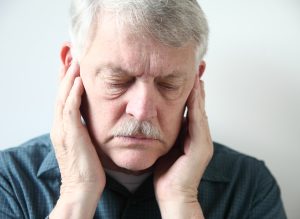 If you wear dentures you may be familiar with gum irritation, but you may not be prepared for symptoms like popping or pain in your jaw, headaches, or neck pain. If you’ve noticed these symptoms, you may be surprised that these may also be caused by your dentures. All of these symptoms can be caused by temporomandibular joint disorder (TMJ). Poor fitting complete dentures can lead to jaw disc displacement, which can increase the risk of TMJ disorders. At Westside Dentistry we are experts in fitting dentures to ensure you avoid problems like these!
If you wear dentures you may be familiar with gum irritation, but you may not be prepared for symptoms like popping or pain in your jaw, headaches, or neck pain. If you’ve noticed these symptoms, you may be surprised that these may also be caused by your dentures. All of these symptoms can be caused by temporomandibular joint disorder (TMJ). Poor fitting complete dentures can lead to jaw disc displacement, which can increase the risk of TMJ disorders. At Westside Dentistry we are experts in fitting dentures to ensure you avoid problems like these!
TMJ Explained
The temporomandibular joints are the joints that connects your jaw to your skull and allows movement of the jaw up and down and side to side. The joints are complex structures consisting of tendons, muscles, and bone. Injury to any part of these structures can cause the symptoms associated with TMJ disorders. Depending on the specific cause, symptoms may occur on either or both sides. The most common symptoms include:
- Popping or grinding when moving the jaw
- Problems moving the jaw or inability to move the jaw normally
- Pain in the jaw that can occur with motion or rest
- Headaches and neck pain
- Ringing in the ears, dizziness, vertigo, or ear pain
TMJ can be difficult to diagnose because these symptoms can be vague and some of them, such as headaches or problems with the ears, may seem unrelated to the jaw. In addition, some sufferers may experience none of these symptoms, or may experience a completely different set of symptoms.
One of the most common causes of TMJ disorders is the displacement of the disc that cushions the bones of the joint. This displacement can interfere with proper functioning and motion of the jaw, which can cause tension in the jaw. A common problem with muscle tension is that it can spread from one area to another, causing pain in areas seemingly unrelated to the root cause. The tension can also lead to unusual pressure being placed on various nerves, causing numbness or tingling.
How Dentures Affect TMJ
In many cases, TMJ disorders are caused by a bad bite. In an individual with healthy teeth, the muscles and jaw joints all work together. Lost or damaged teeth cause the teeth to not fit together as they should. If the teeth don’t fit together well, the jaw joint and muscles cannot work the way they need to. This can cause the muscles to become tired and sore or can cause dislocation of the jaw joint. As the muscles around the jaw joint work in opposition, excessive wear on the teeth can occur, making the bite even worse and leading to a cycle of pain.
For some individuals, these problems can interfere with the ability of the muscles in the neck to hold the head upright. This can cause problems with balance and can even increase the risk of falls.
Ideally, dentures should be crafted in a way that mimics an optimal bite. However, some dentists still follow outdated systems of bite measurement that make it almost impossible to recreate an optimal bite. Even dentures that are perfectly made can lead to problems if not worn at night, or if they are not replaced as needed. Just like ill-fitting shoes, poorly fitted dentures aren’t going to become more comfortable over time.
At Westside Dentistry we focus on dentures and use the latest techniques to ensure you get the best fit. We can build, repair, or reline your dentures to fit your mouth in a way that gives you a more natural bite. Please call on 07 3278 0580 now to arrange an appointment to find out how we can help ease your TMJ pain.

Pretty! This has been an incredibly wonderful post. Thank you for providing this info.